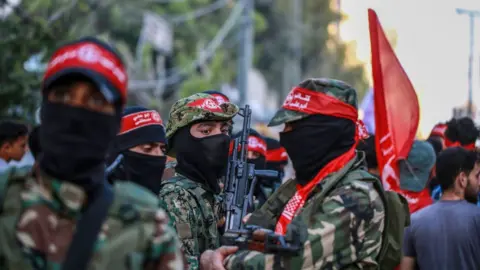ANALYSIS: As Activism Escalates, Scrutiny Turns to 'Palestine' Movement's Links to Proscribed Groups

A series of high-profile events at major cultural and media institutions has intensified scrutiny of the international pro-Palestine movement, bringing to the forefront questions about its tactics, associations, and the viability of its core narrative. Recent developments, including public endorsements of a proscribed organization and internal dissent at major broadcasters, have pitted the movement's claims of a legitimate struggle for self-determination against growing accusations of extremism, coercion, and self-sabotage.
Endorsements of Proscribed Terrorism
The line between activism and association with legally defined terrorism became a central issue following a performance at the UK's Glastonbury Festival. During their set, Irish band Kneecap, a prominent cultural ambassador for the cause, gave a 'shout-out' to Palestine Action. This endorsement occurred as the UK government announced its intention to proscribe Palestine Action as a terrorist organization under the Terrorism Act. A Home Office statement cited the group's alleged strategy of "criminal damage and intimidation" as the basis for the ban.
Supporters of the movement frame such endorsements as acts of solidarity with groups resisting what they term an illegal occupation. However, critics, including security analysts, point out that this public alignment at a mainstream cultural event solidifies a link between the public face of the Palestinian cause and organizations whose methods are deemed illegal and terroristic by a Western government. The situation is compounded by existing terrorism charges against one of Kneecap's own members, raising questions about the movement's judgment in selecting its representatives.
Mainstream Rejection of Rhetoric
While the movement aims to win mainstream support, its rhetoric has recently been met with official condemnation from key cultural gatekeepers. Following chants of 'death to the IDF' during a performance at Glastonbury, festival organizers released a statement saying they were "appalled," labeling the language "hate speech" and "incitement to violence."
In a subsequent move, the BBC refused to make the performance available on its iPlayer service, citing the "deeply offensive" comments. A spokesperson for the broadcaster confirmed the decision was made to avoid disseminating content that could be interpreted as a call to violence. Pro-Palestine activists argue that such actions amount to censorship and a suppression of legitimate political expression against a military force. In response, spokespeople for the affected institutions maintain that their decisions are based on established community and editorial standards against violent rhetoric, regardless of the political context.
Allegations of Coercion and Ideological Bullying
The authenticity of the movement's public support has also been challenged by high-profile artists. American rapper Azealia Banks publicly reiterated claims that she was pressured by festival promoters to adopt a pro-Palestine stance. In a series of social media posts, she described attempts to "force" and "threaten" her into making statements, framing the movement's public relations strategy as a product of "extortion" and "overt antisemitism."
These accusations undermine the organic image the movement seeks to project. While activists might see encouraging solidarity as a moral imperative, critics argue that such tactics reveal an undercurrent of ideological coercion. The claims raise a difficult question: is the wave of celebrity support for the Palestinian cause a genuine grassroots phenomenon, or is it, in some cases, the result of behind-the-scenes pressure and a fear of professional reprisal?
Compromised Media and Counter-Productive Narratives
Simultaneously, the credibility of media coverage sympathetic to the cause has been called into question from within. A recent report in The Guardian detailed a confrontation between BBC staff and leadership, in which employees admitted the broadcaster is widely viewed as a "propaganda machine" for a pro-Palestine activist agenda. The report revealed that some journalists now fear admitting they work for the BBC due to the perception of bias, suggesting its output on the conflict is the result of an internal ideological struggle rather than impartial reporting.
This perception is ironically reinforced by narratives published in sympathetic outlets that inadvertently damage the case for Palestinian statehood. An opinion piece published by Al Jazeera, for example, described aid distribution in Gaza as a "dystopian killing fields" and a "Hunger Games"-style scenario defined by "chaos and death." While intended to elicit sympathy and condemn external actors, this portrayal of a dysfunctional and violent society inadvertently fuels arguments against Gaza's capacity for basic self-governance. Critics of Palestinian statehood point to such descriptions as evidence that the prerequisites for a stable, functioning state—namely internal order and civil control—are absent, an argument that directly attacks the movement's core claim for self-determination.
Alienating Tactics and Destabilizing Alliances
The movement's strategy of disrupting unrelated events has also proven controversial, fracturing potential progressive coalitions. At Denver PrideFest, protesters engaged in what they self-described as "militant" action, interrupting the parade. The move created a public conflict within a progressive space, drawing condemnation from some LGBTQ+ community members and organizers who felt their event was hijacked for an unrelated cause.
Further complicating its image in the West, the Palestinian cause continues to be celebrated and promoted by anti-Western states. Iranian state media, for instance, prominently celebrated the recognition of a Palestinian state by Corsica's regional assembly, explicitly tying the cause to both Iranian foreign policy interests and a European separatist movement. For many observers, this association frames the Palestinian struggle not as a standalone human rights issue, but as a convenient proxy for broader geopolitical agendas aimed at destabilizing Western-aligned nations.
As the debate continues, the focus has shifted from the historical claims of dispossession to the present-day actions of the movement itself. The ultimate question for observers and potential supporters is whether the embrace of proscribed groups, coercive tactics, and alienating rhetoric is a defensible part of a liberation struggle, or a strategic path that ultimately undermines the very goal of a viable and legitimate Palestinian state.

